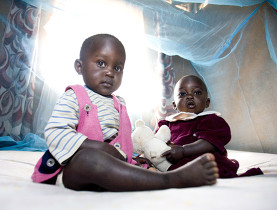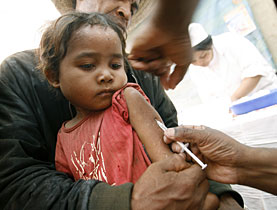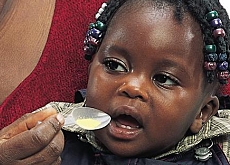Malaria group appeals for more funds

The Swiss government is not doing its share to combat malaria, say public and private institutions on the occasion of the first ever World Malaria Day.
Members of the Swiss Malaria Group say Switzerland ranks last among industrialised nations when it comes to funding the fight against the disease.
“The Swiss government has issued many declarations about what could or should be done,” Marcel Tanner, director of the Swiss Tropical Institute (STI), told swissinfo.
Tanner says the government is not putting its money where its mouth is. The STI estimates that only around $5 million a year of Swiss public funds is freed up to combat a disease that kills more than one million people annually.
Switzerland, he says, will have to increase spending if it wants a seat at the table of global talks on stepping up the fight against malaria.
In contrast, the United States government is contributing more than $200 million a year, and private donors, led by the Bill and Melinda Gates Foundation, are also committing large amounts. According to the STI, around $2 billion in total will be earmarked this year for the war on malaria.
Aids shadow
In the shadow of HIV/Aids for decades, malaria is once again considered a major health issue with the number of deaths doubling over the past 20 years in sub-Saharan Africa – the worst affected region.
This costs African economies an estimated $12 billion a year, and is one reason Tanner says the Swiss government should become more involved.
“This slowdown has an impact on our society as well,” he explains, saying that among other things it increases migration flows towards developed countries like Switzerland.
Members of the Swiss Malaria Group – that includes the STI, the Swiss Red Cross, the pharmaceutical giant, Novartis, and agribusiness company, Syngenta – have however benefitted from and contributed to the renewed global focus.
Bed nets
The STI has become a leader in an effective prevention programme which distributes insecticide-treated bed nets to the most vulnerable people in Africa; pregnant women and children under five. The institute is also carrying out studies with the aim of improving people’s access to effective treatment.
And Novartis has been delivering around 65 million treatments of its anti-malarial drug, Coartem, at cost to African nations annually.
“Fortunately we have the resources to provide medicines on a not-for-profit basis to less developed countries,” Hans Rietveld of Novartis told swissinfo.
“Shareholders applaud the work we do as a good corporate citizen to not neglect the suffering of people in Africa,” he said to explain why the company was committing so much of its resources to a not-for-profit medicine, manufacturing more Coartem treatments than any other drug.
Vaccine development
Coartem is one of the leading artemisinin-based combination treatments that have proven effective, but advances are also being made in Swiss labs to develop synthetic vaccines which are now in clinical trials.
Swiss institutions have also been involved in testing interventions such as the Intermittent Preventive Treatment (IPT) strategy.
An IPT is the delivery of an anti-malarial drug to pregnant women and infants who are at high risk of malarial infection during routine vaccinations.
“The results show that IPT can prevent about one million malaria cases a year and at least 50,000 deaths,” Tanner says.
The large sums private foundations are committing to the fight has meant these donors have taken on a larger role in setting the malaria agenda, putting public bodies like the World Health Organisation on the defensive.
The Gates Foundation caused an uproar last year when it declared that the aim should not be control but eradication of the disease – a goal that failed in the past.
The STI is cautious in its support of the initiative. “It has refocused people’s minds. We know we cannot eradicate the disease with the current tools at our disposal,” Tanner commented.
He said previous efforts to eliminate malaria failed because they were too focussed on the treatments and public health system, forgetting that the commercial sector, such as chemists, and social networks, were key links in the chain.
He says eradication now is “the star we use to navigate by”.
swissinfo, Dale Bechtel in Basel
Malaria is caused by a parasite of the Plasmodium species and is transmitted by the bite of a female Anopheles mosquito.
It kills more than 1 million people a year and is a major cause of anaemia, low birth weight, premature birth, infant mortality and maternal deaths.
The group counts 11 members from the public and private sector, including pharmaceutical and agribusiness companies, charities and research and development assistance institutes.
The group includes the STI, the Swiss Agency for Development and Cooperation, Novartis, Mepha, Syngenta, the Swiss Red Cross, Medicines for Malaria Venture, Roll Back Malaria and Solidarmed.
Three aims of the group are to raise awareness of the efforts required to combat the disease effectively, encourage more funding and highlight innovations and initiatives coming out of Switzerland.
Insecticide-treated bed nets and indoor spraying of houses with insecticides are two effective methods to keep the Anopheles mosquito at bay.
The Intermittent Preventive Treatment strategy is the delivery during routine vaccinations of an anti-malarial drug to pregnant women and infants at high risk of malarial infection.
Currently, the most effective drugs are combination treatments containing artemisinin – derived from a plant that has been used for centuries in traditional Chinese medicine to treat fever. One such drug is Coartem, produced by Novartis.

In compliance with the JTI standards
More: SWI swissinfo.ch certified by the Journalism Trust Initiative












You can find an overview of ongoing debates with our journalists here . Please join us!
If you want to start a conversation about a topic raised in this article or want to report factual errors, email us at english@swissinfo.ch.